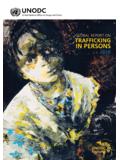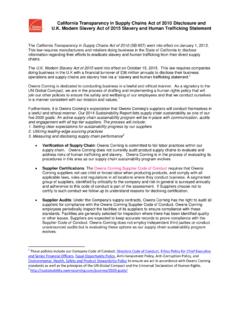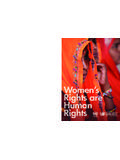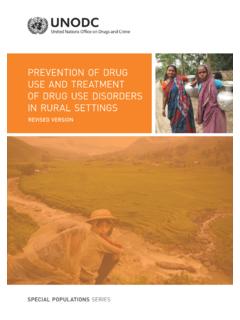Transcription of THE HIGH COURT OF SOUTH AFRICA GAUTENG …
1 1 THE HIGH COURT OF SOUTH AFRICA GAUTENG LOCAL DIVISION, JOHANNESBURG CASE NO: 2016/ 01352 In the matter between: S L First Applicant T H Second Applicant C D Third Applicant C K Fourth Applicant and THE MINISTER OF HOME AFFAIRS First Respondent THE MINISTER OF POLICE Second Respondent THE BOSASA GROUP OF COMPANIES Third Respondent t/a LINDELA REPATRIANTION FACILITY and THE COMMISION FOR GENDER EQUALITY Amicus Curiae JUDGMENT MODIBA J: (1) REPORTABLE: YES / NO (2) OF INTEREST TO OTHER JUDGES: YES/NO (3) REVISED.
2 DATE SIGNATURE 2 INTRODUCTION [1] I heard this application in the urgent motion COURT . After considering the papers and hearing counsel, I granted an order for inter alia the release of the detainees from the Lindela Repatriation Centre (Lindela), that the detainees (the detainees) be accommodated at a home of safety; as well as an order directing the first and second respondents to deal with the detainees in terms of the provisions of the Prevention of Combatting of trafficking in persons (PCTP) Act 7 of 2013.
3 The order would operate as an interim order pending the delivery of this judgment. [2] The application was only opposed by the first respondent. The Commission for Gender Equality (amicus) intervened as amicus curiae at my invitation, and was admitted by agreement of the detainees and the first respondent. I invited the amicus to assist the COURT with certain factual enquiries and to make submissions on legal issues that arose from the papers but not addressed by the parties. These arose mainly from an allegation by the first respondent that the detainees are suspected of being victims of the crime of trafficking in persons for the purpose of sexual exploitation.
4 I requested the amicus to investigate the circumstances of the detainees and report back to the COURT with recommendations on the appropriate legal response to their plight. I am indebted to the amicus for their prompt and positive response to my invitation, as well as to the pro bono legal team for the amicus, Advocate Llewellyn Morland and their instructing attorneys, for availing themselves on an urgent basis, for promptly investigating the circumstances of the detainees and for providing me with a succinct but valuable report.
5 BACKROUND FACTS [3] The detainees are 4 (four) female citizens of the Kingdom of Thailand (Thailand). They are detained at Lindela in the custody of the third respondent pending their deportation to Thailand. They are detained for contravening section 41 (1) (c) of the Immigration Act 13 of 2002. They were arrested on 20 November 2015 and detained at the Johannesburg Police Station from 20 November 2015 until 3 December 2015, when they were relocated to Lindela. More than two months after their arrest when this application came before me, they were still detained at Lindela.
6 3 [4] At the hearing of this application, I mero motu raised a concern whether the detainees founding and supporting affidavits were deposed to in the presence of the commissioner of oaths. Counsel for the detainees tendered the evidence of the detainees instructing attorney to address my concern. I refused him permission to lead this evidence because in respect of the facts within the knowledge of the commissioner of oaths, the evidence constitutes inadmissible hearsay evidence. I dealt with this application over several days in the week it was on the urgent motion COURT roll.
7 The detainees instructing attorney had several opportunities to address my concern but failed to do so. [5] Although on the face of the notice of motion and supporting affidavits, the application purports to be brought by the detainees, I am not satisfied that the application is indeed brought by them. My dissatisfaction with the manner in which their founding and supporting affidavits are deposed to is based on the following grounds: It is common cause that all four applicants are Thai speaking and have at best a poor command of English.
8 Evidently, they signed their affidavits using non-English alphabets. The legal team for the amicus interviewed the detainees at Lindela on 28 January 2016. They were assisted by a Thai translator. The detainees affidavits are deposed to in English. No evidence has been put before the COURT regarding how their affidavits were translated; The commissioner of oaths certificate that appears on the affidavits is in English. There is no evidence attesting to the language in which the oath was administered to the detainees; According to the certificate by the commissioner of oaths, all the detainees deposed to the affidavits at Krugersdorp on 19 January 2016.
9 The place, date and time of deposition is hand written in English in the commissioner of oath s certificate. The commissioner of oaths signed the affidavits using a pen with a different colour and ink type. The commissioner of oaths stated a business address in Nigel, which he allegedly wrote by hand on these affidavits; The detainees attorney also deposed to a supporting affidavit. Ex facie, a pen with the same colour and type of ink was used for signature of the attorney, the signatures of the detainees as well as the insertions in the commissioner of oaths certificate.
10 4 Of all the deponents, the detainees attorney is the only person who understands English. [6] In light of the above facts, I am not satisfied that the oath was administered by the commissioner of oaths, that the detainees signed their affidavits in his presence and that the detainees have personal knowledge of the contents of their affidavits. [7] Notwithstanding my dissatisfaction with the appropriateness of the application for the release of the detainees, I am concerned that the first respondent has detained them for more than 30 days pending their deportation and has failed to put a version before COURT explaining his delay in deporting them.

















